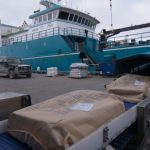The 2008 survey of the UK seafood processing industry, conducted by Seafish, is now available and shows an overall reduction in the size of the industry with the number of processing units and total industry employment both decreasing. Consolidation in the industry has continued but the industry remains characterised by many small processing units and a low number of large units.
The survey, which builds upon the previous reviews of the industry undertaken by Seafish in 1996, 2000 and 2004, shows that seafood processors in the UK continue to operate in a challenging business environment where profit margins are generally low and often reducing.
Adam Brown, from Seafish Economics, said: “The survey provides an excellent overview of trends in the industry and looks at supply, sales, environmental issues and impacts, business management and the financial performance of the industry as a whole.”
“The results indicate a number of changes in the industry. For example, the supply situation for processors is changing. As lower volumes of seafood are landed by fishing vessels in the UK, increasing volumes of partially processed seafood are imported into the UK, particularly by large processing companies. In many cases, smaller processors are finding it increasingly difficult to source adequate raw materials,” continued Adam.
Looking forward, industry is concerned about a number of issues. The future availability of skilled staff is a key concern, as are rising costs. Processors also expect that sourcing raw materials will become more difficult in coming years.
Environmental and sustainability issues are increasingly relevant to industry. The survey results indicate that these issues have a greater impact upon larger processors, however, many smaller processors stated that they think environmental issues will be increasingly important to their business in the coming years.
“The data collected during the survey is valuable to industry. It is regularly used by government and regional agencies to inform policy and funding decisions. I’d like to thank the members of industry who took the time to participate in the project,” concluded Adam.








